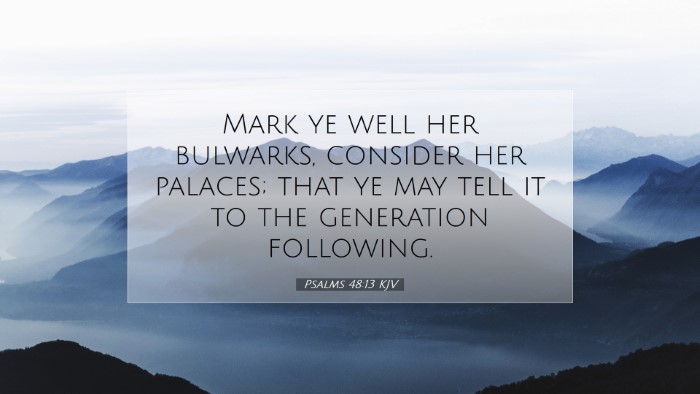Psalms 48:13 - Commentary on the Verse
Bible Verse: Psalms 48:13 - "Mark ye well her bulwarks, consider her palaces; that ye may tell it to the generation following."
Introduction
This verse from Psalms 48 stands as a powerful exhortation to observe and reflect upon the strength and beauty of God's city, Jerusalem. The context of this Psalm celebrates Zion, emphasizing its divine protection and the inherent glory it possesses as the dwelling place of God's presence. Drawing insights from historical and theological commentaries enrich our understanding of this verse, bringing forth its significance to pastors, students, theologians, and Bible scholars.
Examination of Key Themes
- The Importance of Observation: The Psalmist calls upon the faithful to "mark" the city’s bulwarks. This is an invitation to recognize the protective fortifications, both physical and spiritual, that God provides.
- Consideration of God's Provision: The exhortation to "consider her palaces" emphasizes the splendor that comes from God's presence. The palaces may symbolize the worship, justice, and peace that abound within Jerusalem.
- Passing on the Legacy: The ultimate purpose behind this observance is to communicate these truths to future generations. This reflects not only the need for remembrance but also the imperative of teaching these lessons to those who will inherit the faith.
Insights from Commentaries
Matthew Henry's Commentary
Matthew Henry expounds on this verse by emphasizing the significance of the bulwarks as a representation of God's protection over His people. He notes that Jerusalem's walls and palaces are not merely physical structures, but they symbolize the spiritual fortification that God provides to His people. Henry encourages believers to take note of these features as reminders of God's faithfulness throughout generations. He urges readers to reflect on God's sustaining power that is manifested through His sacred city.
Albert Barnes' Notes
Albert Barnes highlights the imperative of "marking" and "considering" as a means of fostering appreciation for God’s mighty works. He suggests that the bulwarks represent not only a defense against enemies but also the peace and security that comes from God’s presence. The palaces mentioned serve to remind us of the majesty and beauty inherent in living under God's protection. Barnes stresses the responsibility of the present generation to engage with these reminders so that they can faithfully pass down the narratives of God’s greatness and faithfulness to those who follow.
Adam Clarke's Commentary
Adam Clarke offers a perspective focused on the concept of architectural beauty and strength, linking it to the divine nature of God’s covenant with His people. Clarke interprets the bulwarks and palaces as symbols of God's steadfastness and the splendor of His glory manifested in His dwelling place. He emphasizes the role of the faithful in recognizing and recording God’s deeds, suggesting that to "tell it to the generation following" may also involve a prophetic role, where the past actions of God serve as a prelude to future expectations of His faithfulness.
Theological Implications
- The Assurance of God's Protection: This verse reassures believers that God’s providence is active; His physical and spiritual walls are impenetrable.
- Encouragement in Worship: The palaces can be viewed as the focus of worship; hence, the desire to understand and convey the significance of worship is highlighted.
- Generation to Generation: The command to communicate the wonder of God's deeds emphasizes the church's mission to educate and pass on faith, thus fostering continuity in the faith community.
Application for Today's Believers
As modern-day believers, we can derive significant lessons from Psalms 48:13. First, we must cultivate a habit of observance regarding God's works, whether in our individual lives or within our communities. Second, we are called to engage in deeper reflection on the beauty of divinely instituted worship. Finally, we bear the responsibility to ensure that our understanding and experiences of God’s faithfulness are communicated to the next generation, fostering a legacy of faith that endures.
Conclusion
Psalms 48:13 encapsulates an essential aspect of the believer's journey: the need to acknowledge and reflect upon God’s protective presence and beauty, while actively passing these truths to the generations that follow. Through the insights provided by esteemed commentators such as Matthew Henry, Albert Barnes, and Adam Clarke, we are reminded of our roles as both witnesses and teachers of God’s enduring faithfulness. As we meditate on this verse, may we be inspired to deepen our appreciation for God’s work in history and our lives, and remain committed to sharing His stories of grace.


